Progression in Leadership Thought
VerifiedAdded on 2023/04/20
|11
|2214
|209
AI Summary
This annotated bibliography and outline explores the progression in leadership thought, focusing on different leadership styles and their impact on organizational goals. It includes a study on whether charisma can be taught and its effects on leadership outcomes. The paper also examines the relationship between leader intelligence, personality, emotional intelligence, and transformational leadership. Additionally, it discusses the importance of understanding what drives people in an organization and how to increase leadership effectiveness. Lastly, it critically reviews the literature on organizational citizenship behavior among leaders.
Contribute Materials
Your contribution can guide someone’s learning journey. Share your
documents today.
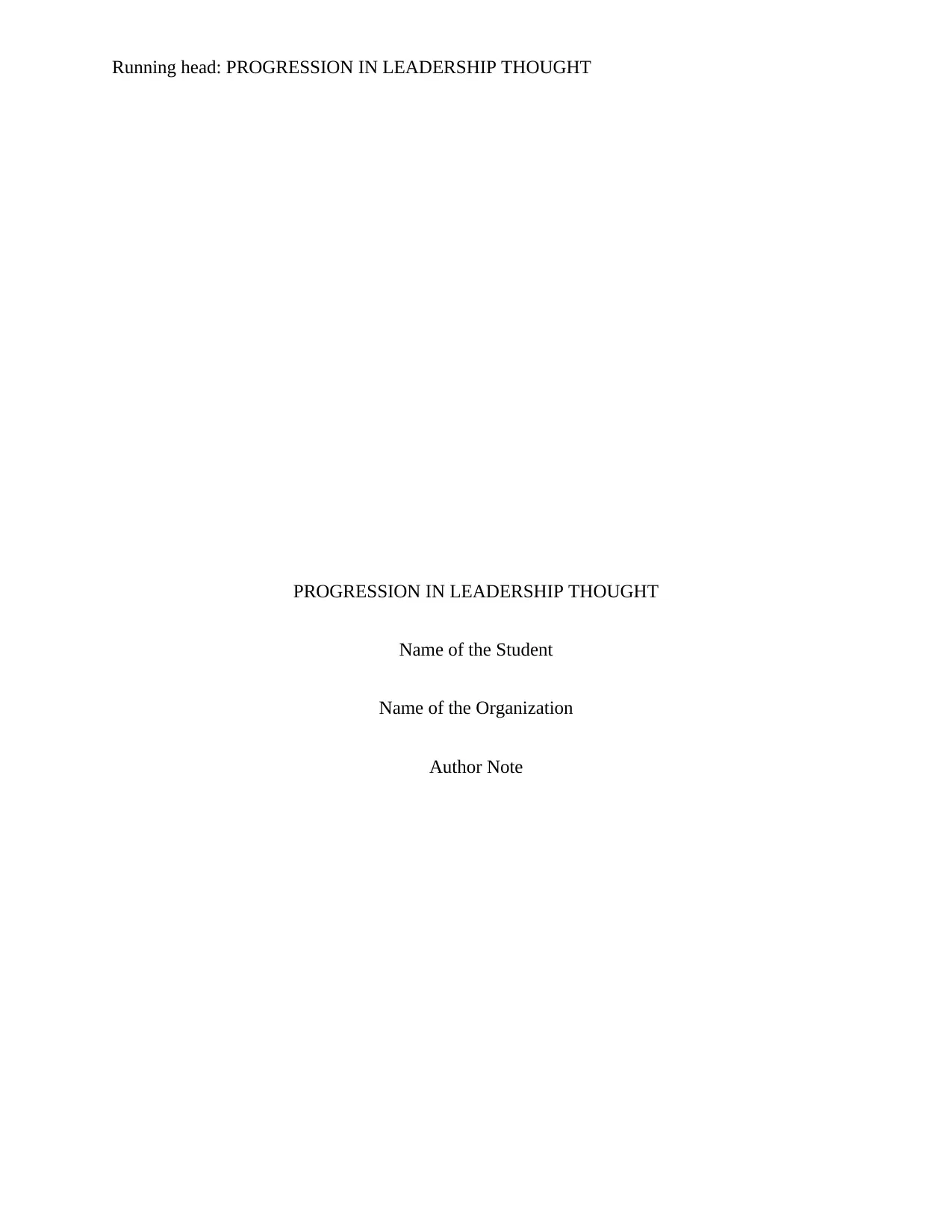
Running head: PROGRESSION IN LEADERSHIP THOUGHT
PROGRESSION IN LEADERSHIP THOUGHT
Name of the Student
Name of the Organization
Author Note
PROGRESSION IN LEADERSHIP THOUGHT
Name of the Student
Name of the Organization
Author Note
Secure Best Marks with AI Grader
Need help grading? Try our AI Grader for instant feedback on your assignments.
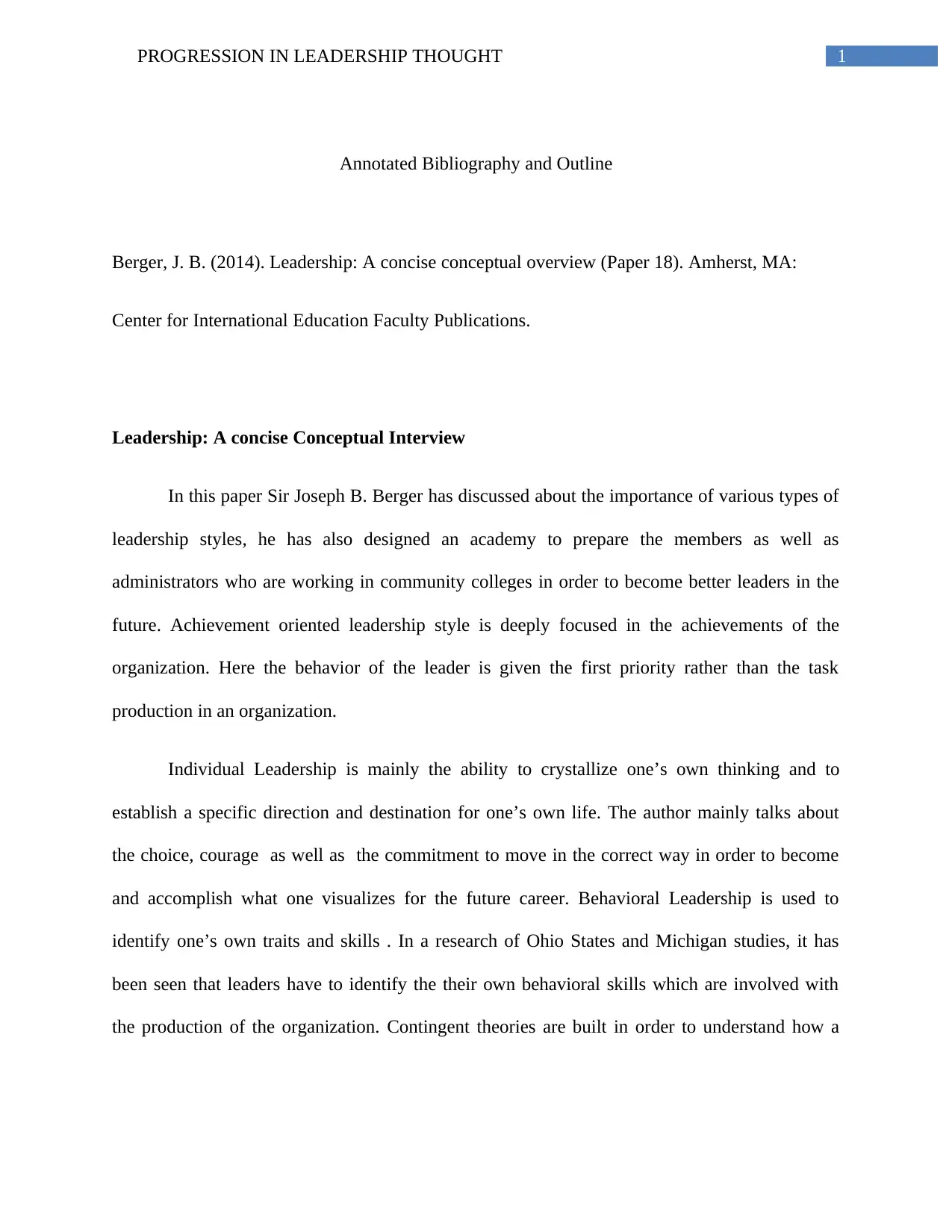
1PROGRESSION IN LEADERSHIP THOUGHT
Annotated Bibliography and Outline
Berger, J. B. (2014). Leadership: A concise conceptual overview (Paper 18). Amherst, MA:
Center for International Education Faculty Publications.
Leadership: A concise Conceptual Interview
In this paper Sir Joseph B. Berger has discussed about the importance of various types of
leadership styles, he has also designed an academy to prepare the members as well as
administrators who are working in community colleges in order to become better leaders in the
future. Achievement oriented leadership style is deeply focused in the achievements of the
organization. Here the behavior of the leader is given the first priority rather than the task
production in an organization.
Individual Leadership is mainly the ability to crystallize one’s own thinking and to
establish a specific direction and destination for one’s own life. The author mainly talks about
the choice, courage as well as the commitment to move in the correct way in order to become
and accomplish what one visualizes for the future career. Behavioral Leadership is used to
identify one’s own traits and skills . In a research of Ohio States and Michigan studies, it has
been seen that leaders have to identify the their own behavioral skills which are involved with
the production of the organization. Contingent theories are built in order to understand how a
Annotated Bibliography and Outline
Berger, J. B. (2014). Leadership: A concise conceptual overview (Paper 18). Amherst, MA:
Center for International Education Faculty Publications.
Leadership: A concise Conceptual Interview
In this paper Sir Joseph B. Berger has discussed about the importance of various types of
leadership styles, he has also designed an academy to prepare the members as well as
administrators who are working in community colleges in order to become better leaders in the
future. Achievement oriented leadership style is deeply focused in the achievements of the
organization. Here the behavior of the leader is given the first priority rather than the task
production in an organization.
Individual Leadership is mainly the ability to crystallize one’s own thinking and to
establish a specific direction and destination for one’s own life. The author mainly talks about
the choice, courage as well as the commitment to move in the correct way in order to become
and accomplish what one visualizes for the future career. Behavioral Leadership is used to
identify one’s own traits and skills . In a research of Ohio States and Michigan studies, it has
been seen that leaders have to identify the their own behavioral skills which are involved with
the production of the organization. Contingent theories are built in order to understand how a
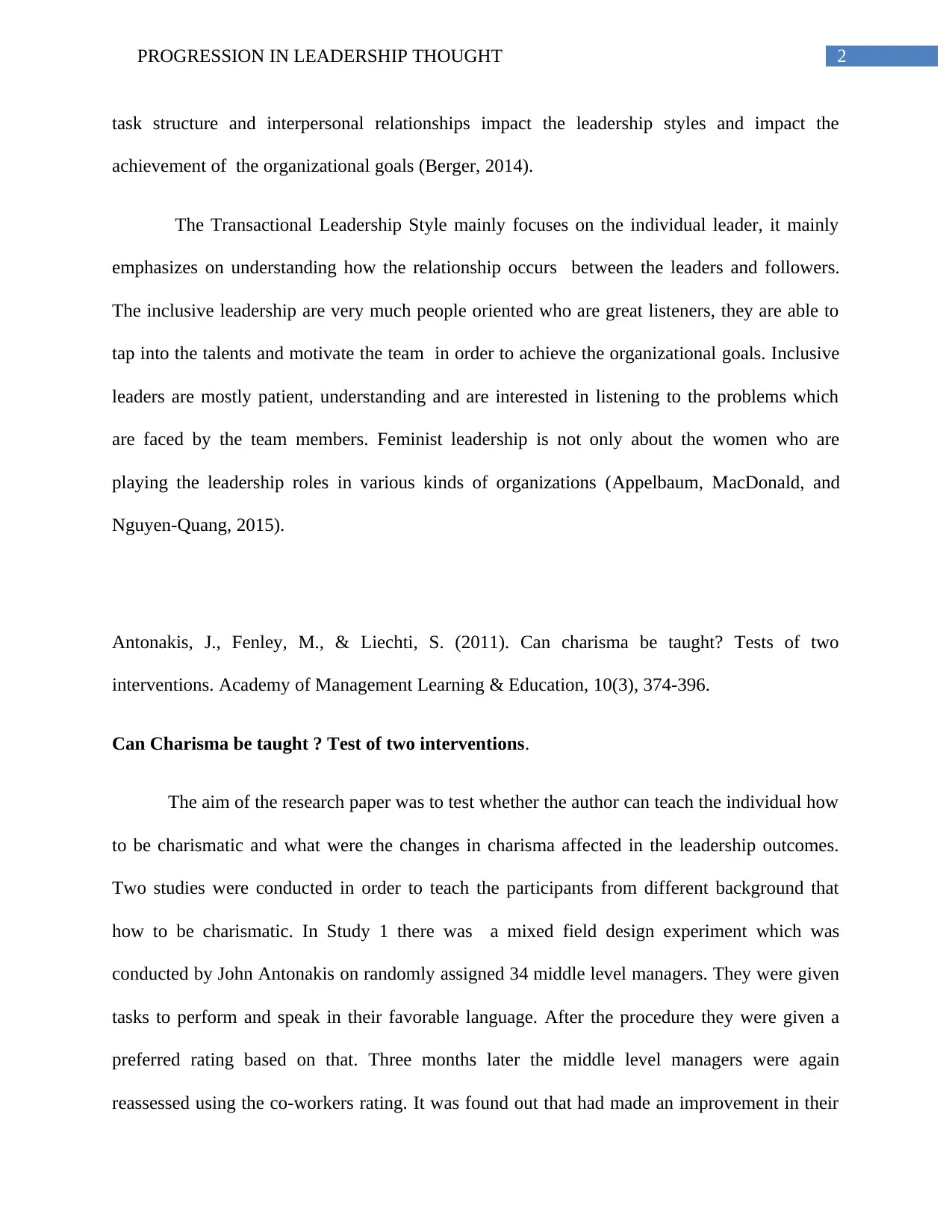
2PROGRESSION IN LEADERSHIP THOUGHT
task structure and interpersonal relationships impact the leadership styles and impact the
achievement of the organizational goals (Berger, 2014).
The Transactional Leadership Style mainly focuses on the individual leader, it mainly
emphasizes on understanding how the relationship occurs between the leaders and followers.
The inclusive leadership are very much people oriented who are great listeners, they are able to
tap into the talents and motivate the team in order to achieve the organizational goals. Inclusive
leaders are mostly patient, understanding and are interested in listening to the problems which
are faced by the team members. Feminist leadership is not only about the women who are
playing the leadership roles in various kinds of organizations (Appelbaum, MacDonald, and
Nguyen-Quang, 2015).
Antonakis, J., Fenley, M., & Liechti, S. (2011). Can charisma be taught? Tests of two
interventions. Academy of Management Learning & Education, 10(3), 374-396.
Can Charisma be taught ? Test of two interventions.
The aim of the research paper was to test whether the author can teach the individual how
to be charismatic and what were the changes in charisma affected in the leadership outcomes.
Two studies were conducted in order to teach the participants from different background that
how to be charismatic. In Study 1 there was a mixed field design experiment which was
conducted by John Antonakis on randomly assigned 34 middle level managers. They were given
tasks to perform and speak in their favorable language. After the procedure they were given a
preferred rating based on that. Three months later the middle level managers were again
reassessed using the co-workers rating. It was found out that had made an improvement in their
task structure and interpersonal relationships impact the leadership styles and impact the
achievement of the organizational goals (Berger, 2014).
The Transactional Leadership Style mainly focuses on the individual leader, it mainly
emphasizes on understanding how the relationship occurs between the leaders and followers.
The inclusive leadership are very much people oriented who are great listeners, they are able to
tap into the talents and motivate the team in order to achieve the organizational goals. Inclusive
leaders are mostly patient, understanding and are interested in listening to the problems which
are faced by the team members. Feminist leadership is not only about the women who are
playing the leadership roles in various kinds of organizations (Appelbaum, MacDonald, and
Nguyen-Quang, 2015).
Antonakis, J., Fenley, M., & Liechti, S. (2011). Can charisma be taught? Tests of two
interventions. Academy of Management Learning & Education, 10(3), 374-396.
Can Charisma be taught ? Test of two interventions.
The aim of the research paper was to test whether the author can teach the individual how
to be charismatic and what were the changes in charisma affected in the leadership outcomes.
Two studies were conducted in order to teach the participants from different background that
how to be charismatic. In Study 1 there was a mixed field design experiment which was
conducted by John Antonakis on randomly assigned 34 middle level managers. They were given
tasks to perform and speak in their favorable language. After the procedure they were given a
preferred rating based on that. Three months later the middle level managers were again
reassessed using the co-workers rating. It was found out that had made an improvement in their
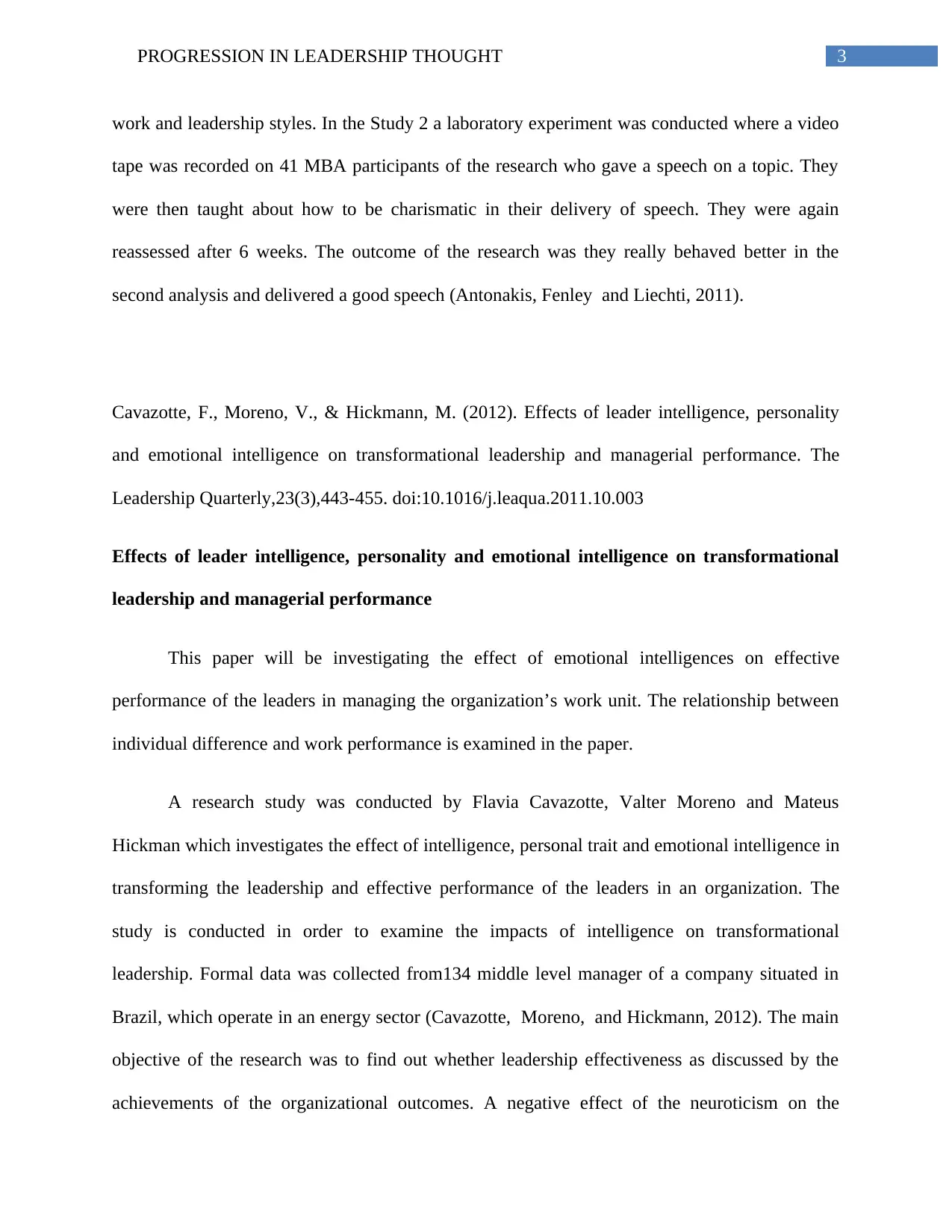
3PROGRESSION IN LEADERSHIP THOUGHT
work and leadership styles. In the Study 2 a laboratory experiment was conducted where a video
tape was recorded on 41 MBA participants of the research who gave a speech on a topic. They
were then taught about how to be charismatic in their delivery of speech. They were again
reassessed after 6 weeks. The outcome of the research was they really behaved better in the
second analysis and delivered a good speech (Antonakis, Fenley and Liechti, 2011).
Cavazotte, F., Moreno, V., & Hickmann, M. (2012). Effects of leader intelligence, personality
and emotional intelligence on transformational leadership and managerial performance. The
Leadership Quarterly,23(3),443-455. doi:10.1016/j.leaqua.2011.10.003
Effects of leader intelligence, personality and emotional intelligence on transformational
leadership and managerial performance
This paper will be investigating the effect of emotional intelligences on effective
performance of the leaders in managing the organization’s work unit. The relationship between
individual difference and work performance is examined in the paper.
A research study was conducted by Flavia Cavazotte, Valter Moreno and Mateus
Hickman which investigates the effect of intelligence, personal trait and emotional intelligence in
transforming the leadership and effective performance of the leaders in an organization. The
study is conducted in order to examine the impacts of intelligence on transformational
leadership. Formal data was collected from134 middle level manager of a company situated in
Brazil, which operate in an energy sector (Cavazotte, Moreno, and Hickmann, 2012). The main
objective of the research was to find out whether leadership effectiveness as discussed by the
achievements of the organizational outcomes. A negative effect of the neuroticism on the
work and leadership styles. In the Study 2 a laboratory experiment was conducted where a video
tape was recorded on 41 MBA participants of the research who gave a speech on a topic. They
were then taught about how to be charismatic in their delivery of speech. They were again
reassessed after 6 weeks. The outcome of the research was they really behaved better in the
second analysis and delivered a good speech (Antonakis, Fenley and Liechti, 2011).
Cavazotte, F., Moreno, V., & Hickmann, M. (2012). Effects of leader intelligence, personality
and emotional intelligence on transformational leadership and managerial performance. The
Leadership Quarterly,23(3),443-455. doi:10.1016/j.leaqua.2011.10.003
Effects of leader intelligence, personality and emotional intelligence on transformational
leadership and managerial performance
This paper will be investigating the effect of emotional intelligences on effective
performance of the leaders in managing the organization’s work unit. The relationship between
individual difference and work performance is examined in the paper.
A research study was conducted by Flavia Cavazotte, Valter Moreno and Mateus
Hickman which investigates the effect of intelligence, personal trait and emotional intelligence in
transforming the leadership and effective performance of the leaders in an organization. The
study is conducted in order to examine the impacts of intelligence on transformational
leadership. Formal data was collected from134 middle level manager of a company situated in
Brazil, which operate in an energy sector (Cavazotte, Moreno, and Hickmann, 2012). The main
objective of the research was to find out whether leadership effectiveness as discussed by the
achievements of the organizational outcomes. A negative effect of the neuroticism on the
Secure Best Marks with AI Grader
Need help grading? Try our AI Grader for instant feedback on your assignments.
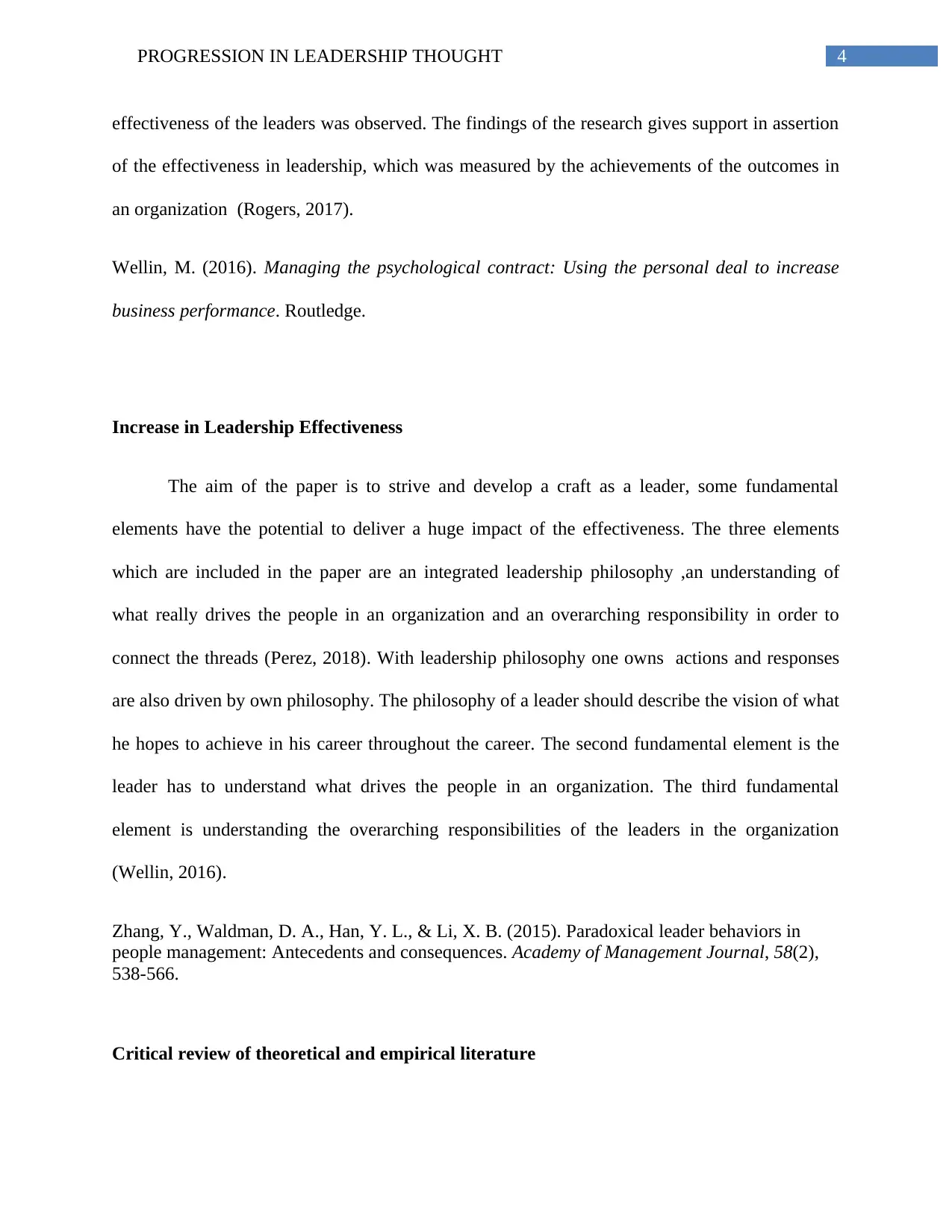
4PROGRESSION IN LEADERSHIP THOUGHT
effectiveness of the leaders was observed. The findings of the research gives support in assertion
of the effectiveness in leadership, which was measured by the achievements of the outcomes in
an organization (Rogers, 2017).
Wellin, M. (2016). Managing the psychological contract: Using the personal deal to increase
business performance. Routledge.
Increase in Leadership Effectiveness
The aim of the paper is to strive and develop a craft as a leader, some fundamental
elements have the potential to deliver a huge impact of the effectiveness. The three elements
which are included in the paper are an integrated leadership philosophy ,an understanding of
what really drives the people in an organization and an overarching responsibility in order to
connect the threads (Perez, 2018). With leadership philosophy one owns actions and responses
are also driven by own philosophy. The philosophy of a leader should describe the vision of what
he hopes to achieve in his career throughout the career. The second fundamental element is the
leader has to understand what drives the people in an organization. The third fundamental
element is understanding the overarching responsibilities of the leaders in the organization
(Wellin, 2016).
Zhang, Y., Waldman, D. A., Han, Y. L., & Li, X. B. (2015). Paradoxical leader behaviors in
people management: Antecedents and consequences. Academy of Management Journal, 58(2),
538-566.
Critical review of theoretical and empirical literature
effectiveness of the leaders was observed. The findings of the research gives support in assertion
of the effectiveness in leadership, which was measured by the achievements of the outcomes in
an organization (Rogers, 2017).
Wellin, M. (2016). Managing the psychological contract: Using the personal deal to increase
business performance. Routledge.
Increase in Leadership Effectiveness
The aim of the paper is to strive and develop a craft as a leader, some fundamental
elements have the potential to deliver a huge impact of the effectiveness. The three elements
which are included in the paper are an integrated leadership philosophy ,an understanding of
what really drives the people in an organization and an overarching responsibility in order to
connect the threads (Perez, 2018). With leadership philosophy one owns actions and responses
are also driven by own philosophy. The philosophy of a leader should describe the vision of what
he hopes to achieve in his career throughout the career. The second fundamental element is the
leader has to understand what drives the people in an organization. The third fundamental
element is understanding the overarching responsibilities of the leaders in the organization
(Wellin, 2016).
Zhang, Y., Waldman, D. A., Han, Y. L., & Li, X. B. (2015). Paradoxical leader behaviors in
people management: Antecedents and consequences. Academy of Management Journal, 58(2),
538-566.
Critical review of theoretical and empirical literature
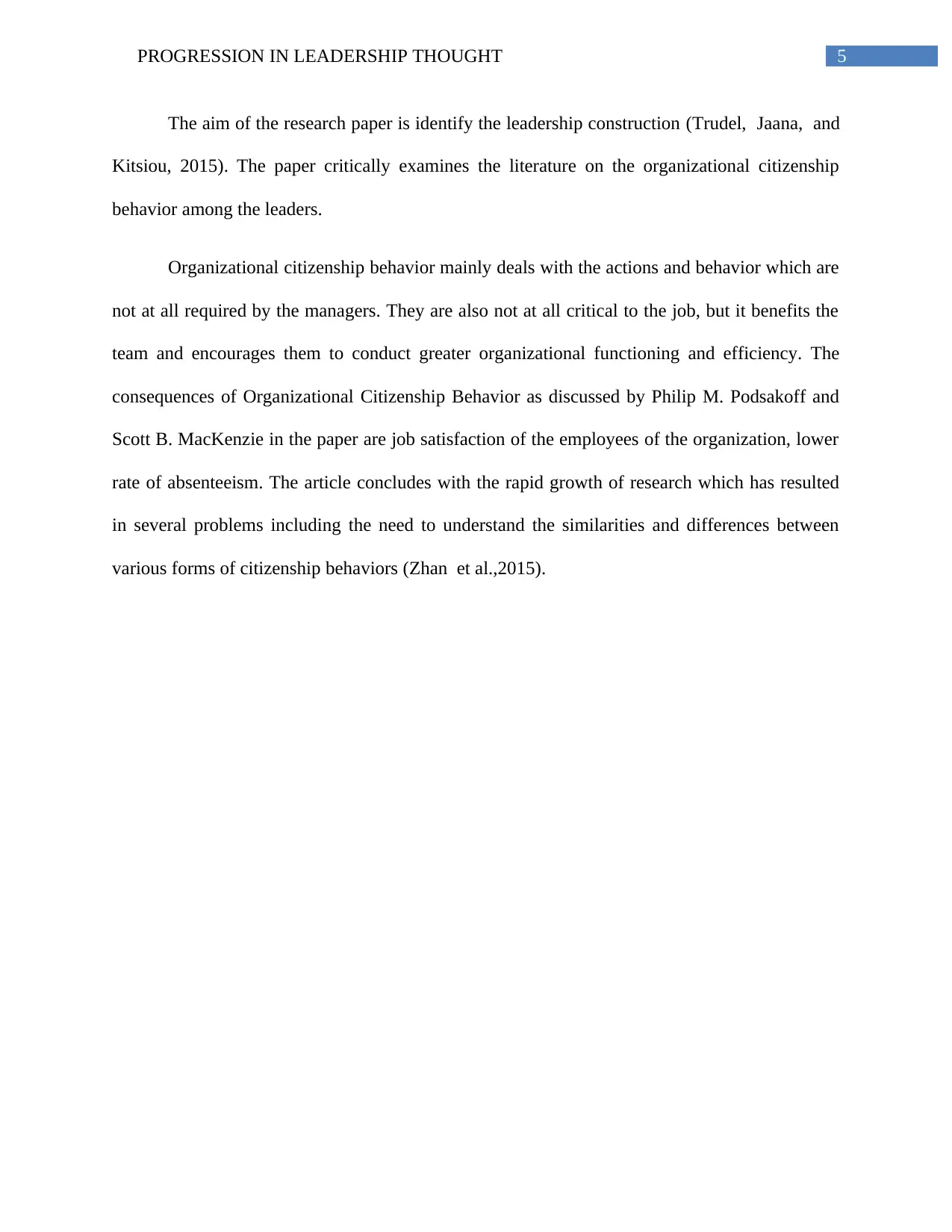
5PROGRESSION IN LEADERSHIP THOUGHT
The aim of the research paper is identify the leadership construction (Trudel, Jaana, and
Kitsiou, 2015). The paper critically examines the literature on the organizational citizenship
behavior among the leaders.
Organizational citizenship behavior mainly deals with the actions and behavior which are
not at all required by the managers. They are also not at all critical to the job, but it benefits the
team and encourages them to conduct greater organizational functioning and efficiency. The
consequences of Organizational Citizenship Behavior as discussed by Philip M. Podsakoff and
Scott B. MacKenzie in the paper are job satisfaction of the employees of the organization, lower
rate of absenteeism. The article concludes with the rapid growth of research which has resulted
in several problems including the need to understand the similarities and differences between
various forms of citizenship behaviors (Zhan et al.,2015).
The aim of the research paper is identify the leadership construction (Trudel, Jaana, and
Kitsiou, 2015). The paper critically examines the literature on the organizational citizenship
behavior among the leaders.
Organizational citizenship behavior mainly deals with the actions and behavior which are
not at all required by the managers. They are also not at all critical to the job, but it benefits the
team and encourages them to conduct greater organizational functioning and efficiency. The
consequences of Organizational Citizenship Behavior as discussed by Philip M. Podsakoff and
Scott B. MacKenzie in the paper are job satisfaction of the employees of the organization, lower
rate of absenteeism. The article concludes with the rapid growth of research which has resulted
in several problems including the need to understand the similarities and differences between
various forms of citizenship behaviors (Zhan et al.,2015).
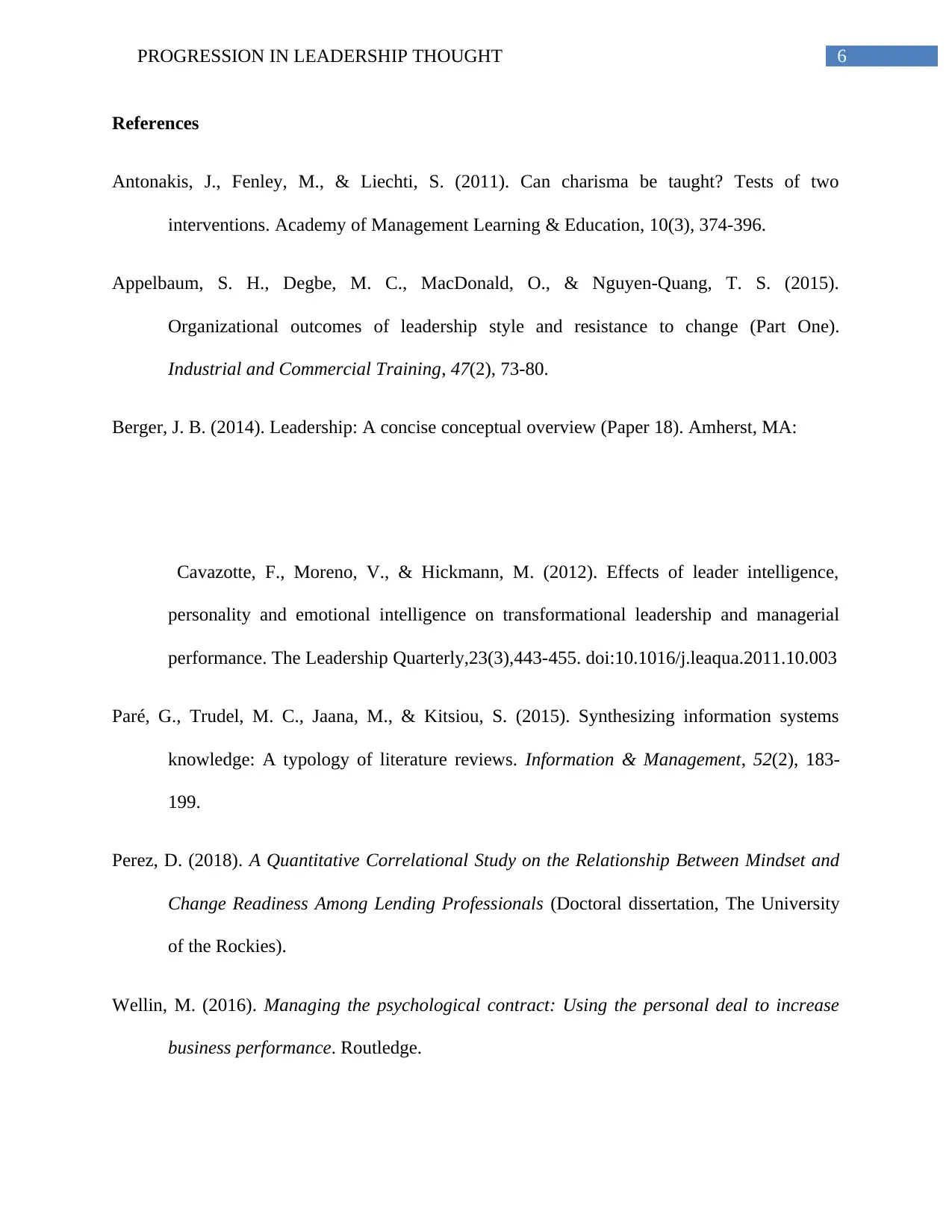
6PROGRESSION IN LEADERSHIP THOUGHT
References
Antonakis, J., Fenley, M., & Liechti, S. (2011). Can charisma be taught? Tests of two
interventions. Academy of Management Learning & Education, 10(3), 374-396.
Appelbaum, S. H., Degbe, M. C., MacDonald, O., & Nguyen-Quang, T. S. (2015).
Organizational outcomes of leadership style and resistance to change (Part One).
Industrial and Commercial Training, 47(2), 73-80.
Berger, J. B. (2014). Leadership: A concise conceptual overview (Paper 18). Amherst, MA:
Cavazotte, F., Moreno, V., & Hickmann, M. (2012). Effects of leader intelligence,
personality and emotional intelligence on transformational leadership and managerial
performance. The Leadership Quarterly,23(3),443-455. doi:10.1016/j.leaqua.2011.10.003
Paré, G., Trudel, M. C., Jaana, M., & Kitsiou, S. (2015). Synthesizing information systems
knowledge: A typology of literature reviews. Information & Management, 52(2), 183-
199.
Perez, D. (2018). A Quantitative Correlational Study on the Relationship Between Mindset and
Change Readiness Among Lending Professionals (Doctoral dissertation, The University
of the Rockies).
Wellin, M. (2016). Managing the psychological contract: Using the personal deal to increase
business performance. Routledge.
References
Antonakis, J., Fenley, M., & Liechti, S. (2011). Can charisma be taught? Tests of two
interventions. Academy of Management Learning & Education, 10(3), 374-396.
Appelbaum, S. H., Degbe, M. C., MacDonald, O., & Nguyen-Quang, T. S. (2015).
Organizational outcomes of leadership style and resistance to change (Part One).
Industrial and Commercial Training, 47(2), 73-80.
Berger, J. B. (2014). Leadership: A concise conceptual overview (Paper 18). Amherst, MA:
Cavazotte, F., Moreno, V., & Hickmann, M. (2012). Effects of leader intelligence,
personality and emotional intelligence on transformational leadership and managerial
performance. The Leadership Quarterly,23(3),443-455. doi:10.1016/j.leaqua.2011.10.003
Paré, G., Trudel, M. C., Jaana, M., & Kitsiou, S. (2015). Synthesizing information systems
knowledge: A typology of literature reviews. Information & Management, 52(2), 183-
199.
Perez, D. (2018). A Quantitative Correlational Study on the Relationship Between Mindset and
Change Readiness Among Lending Professionals (Doctoral dissertation, The University
of the Rockies).
Wellin, M. (2016). Managing the psychological contract: Using the personal deal to increase
business performance. Routledge.
Paraphrase This Document
Need a fresh take? Get an instant paraphrase of this document with our AI Paraphraser
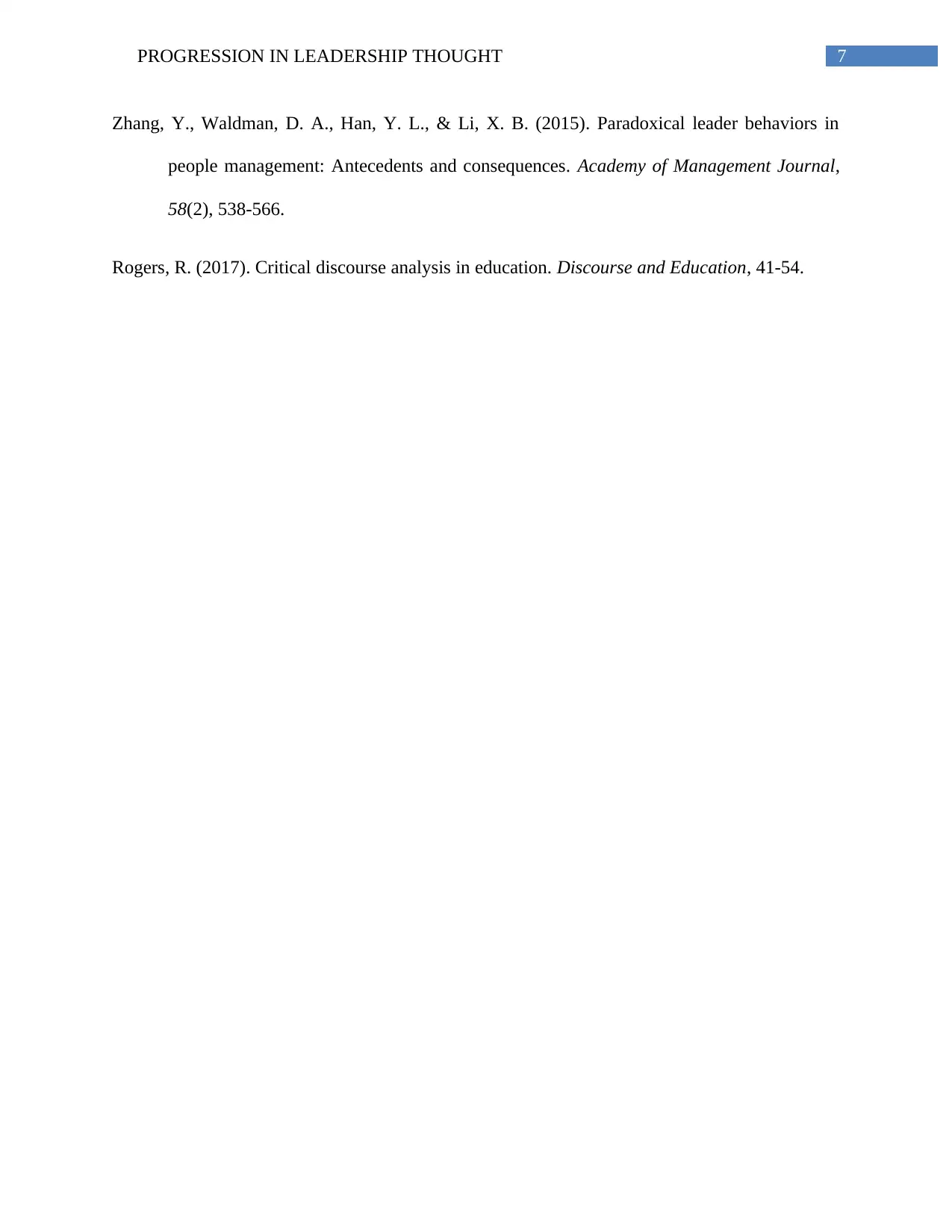
7PROGRESSION IN LEADERSHIP THOUGHT
Zhang, Y., Waldman, D. A., Han, Y. L., & Li, X. B. (2015). Paradoxical leader behaviors in
people management: Antecedents and consequences. Academy of Management Journal,
58(2), 538-566.
Rogers, R. (2017). Critical discourse analysis in education. Discourse and Education, 41-54.
Zhang, Y., Waldman, D. A., Han, Y. L., & Li, X. B. (2015). Paradoxical leader behaviors in
people management: Antecedents and consequences. Academy of Management Journal,
58(2), 538-566.
Rogers, R. (2017). Critical discourse analysis in education. Discourse and Education, 41-54.
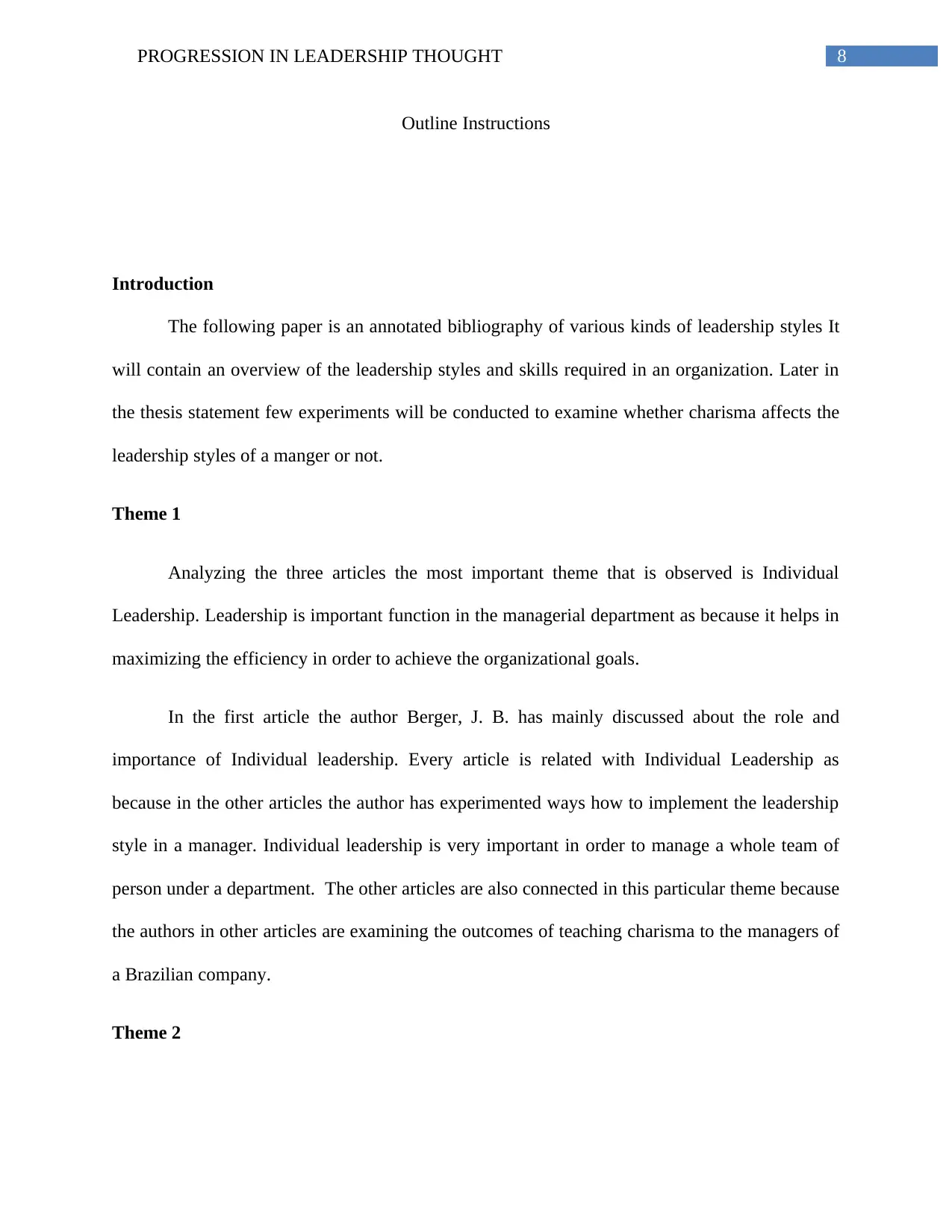
8PROGRESSION IN LEADERSHIP THOUGHT
Outline Instructions
Introduction
The following paper is an annotated bibliography of various kinds of leadership styles It
will contain an overview of the leadership styles and skills required in an organization. Later in
the thesis statement few experiments will be conducted to examine whether charisma affects the
leadership styles of a manger or not.
Theme 1
Analyzing the three articles the most important theme that is observed is Individual
Leadership. Leadership is important function in the managerial department as because it helps in
maximizing the efficiency in order to achieve the organizational goals.
In the first article the author Berger, J. B. has mainly discussed about the role and
importance of Individual leadership. Every article is related with Individual Leadership as
because in the other articles the author has experimented ways how to implement the leadership
style in a manager. Individual leadership is very important in order to manage a whole team of
person under a department. The other articles are also connected in this particular theme because
the authors in other articles are examining the outcomes of teaching charisma to the managers of
a Brazilian company.
Theme 2
Outline Instructions
Introduction
The following paper is an annotated bibliography of various kinds of leadership styles It
will contain an overview of the leadership styles and skills required in an organization. Later in
the thesis statement few experiments will be conducted to examine whether charisma affects the
leadership styles of a manger or not.
Theme 1
Analyzing the three articles the most important theme that is observed is Individual
Leadership. Leadership is important function in the managerial department as because it helps in
maximizing the efficiency in order to achieve the organizational goals.
In the first article the author Berger, J. B. has mainly discussed about the role and
importance of Individual leadership. Every article is related with Individual Leadership as
because in the other articles the author has experimented ways how to implement the leadership
style in a manager. Individual leadership is very important in order to manage a whole team of
person under a department. The other articles are also connected in this particular theme because
the authors in other articles are examining the outcomes of teaching charisma to the managers of
a Brazilian company.
Theme 2
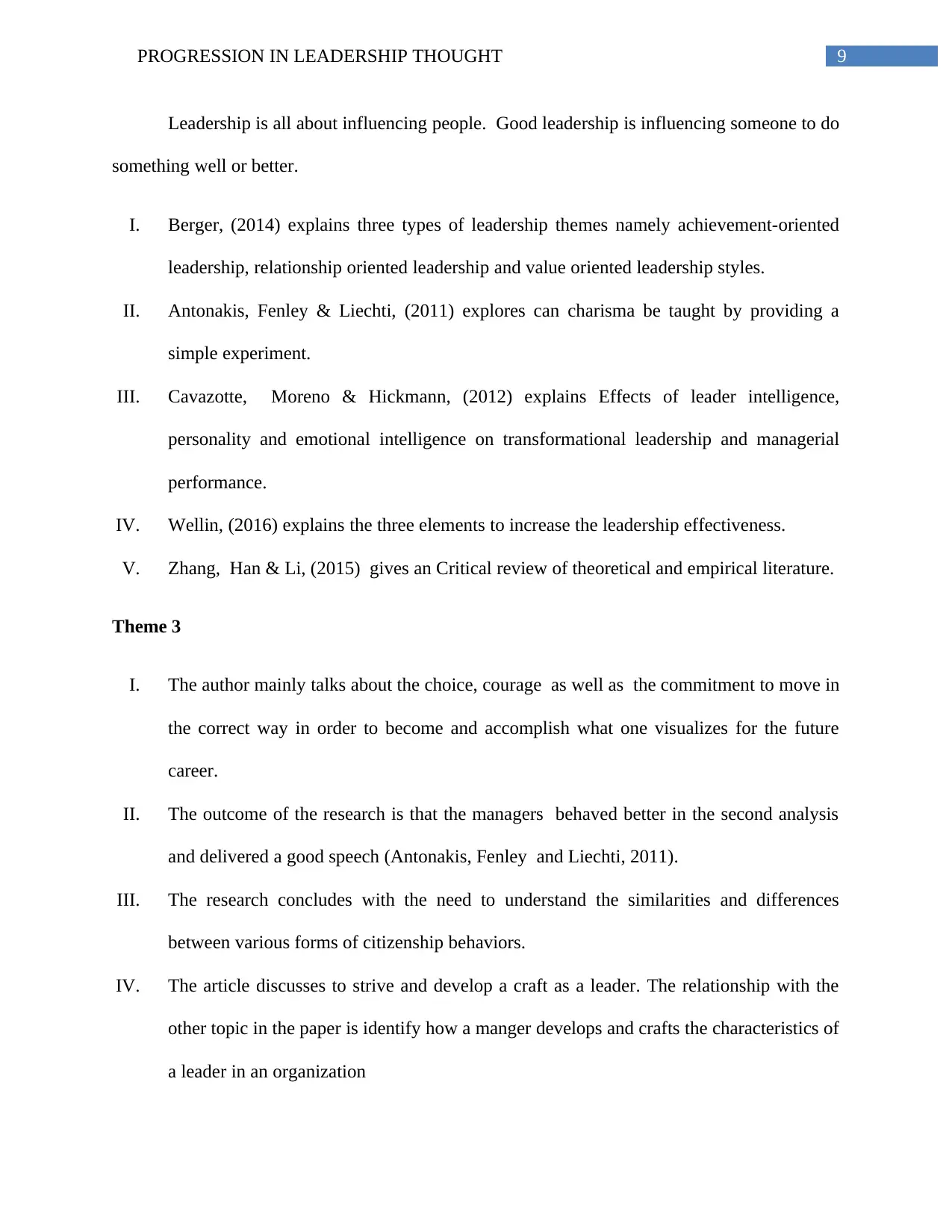
9PROGRESSION IN LEADERSHIP THOUGHT
Leadership is all about influencing people. Good leadership is influencing someone to do
something well or better.
I. Berger, (2014) explains three types of leadership themes namely achievement-oriented
leadership, relationship oriented leadership and value oriented leadership styles.
II. Antonakis, Fenley & Liechti, (2011) explores can charisma be taught by providing a
simple experiment.
III. Cavazotte, Moreno & Hickmann, (2012) explains Effects of leader intelligence,
personality and emotional intelligence on transformational leadership and managerial
performance.
IV. Wellin, (2016) explains the three elements to increase the leadership effectiveness.
V. Zhang, Han & Li, (2015) gives an Critical review of theoretical and empirical literature.
Theme 3
I. The author mainly talks about the choice, courage as well as the commitment to move in
the correct way in order to become and accomplish what one visualizes for the future
career.
II. The outcome of the research is that the managers behaved better in the second analysis
and delivered a good speech (Antonakis, Fenley and Liechti, 2011).
III. The research concludes with the need to understand the similarities and differences
between various forms of citizenship behaviors.
IV. The article discusses to strive and develop a craft as a leader. The relationship with the
other topic in the paper is identify how a manger develops and crafts the characteristics of
a leader in an organization
Leadership is all about influencing people. Good leadership is influencing someone to do
something well or better.
I. Berger, (2014) explains three types of leadership themes namely achievement-oriented
leadership, relationship oriented leadership and value oriented leadership styles.
II. Antonakis, Fenley & Liechti, (2011) explores can charisma be taught by providing a
simple experiment.
III. Cavazotte, Moreno & Hickmann, (2012) explains Effects of leader intelligence,
personality and emotional intelligence on transformational leadership and managerial
performance.
IV. Wellin, (2016) explains the three elements to increase the leadership effectiveness.
V. Zhang, Han & Li, (2015) gives an Critical review of theoretical and empirical literature.
Theme 3
I. The author mainly talks about the choice, courage as well as the commitment to move in
the correct way in order to become and accomplish what one visualizes for the future
career.
II. The outcome of the research is that the managers behaved better in the second analysis
and delivered a good speech (Antonakis, Fenley and Liechti, 2011).
III. The research concludes with the need to understand the similarities and differences
between various forms of citizenship behaviors.
IV. The article discusses to strive and develop a craft as a leader. The relationship with the
other topic in the paper is identify how a manger develops and crafts the characteristics of
a leader in an organization
Secure Best Marks with AI Grader
Need help grading? Try our AI Grader for instant feedback on your assignments.
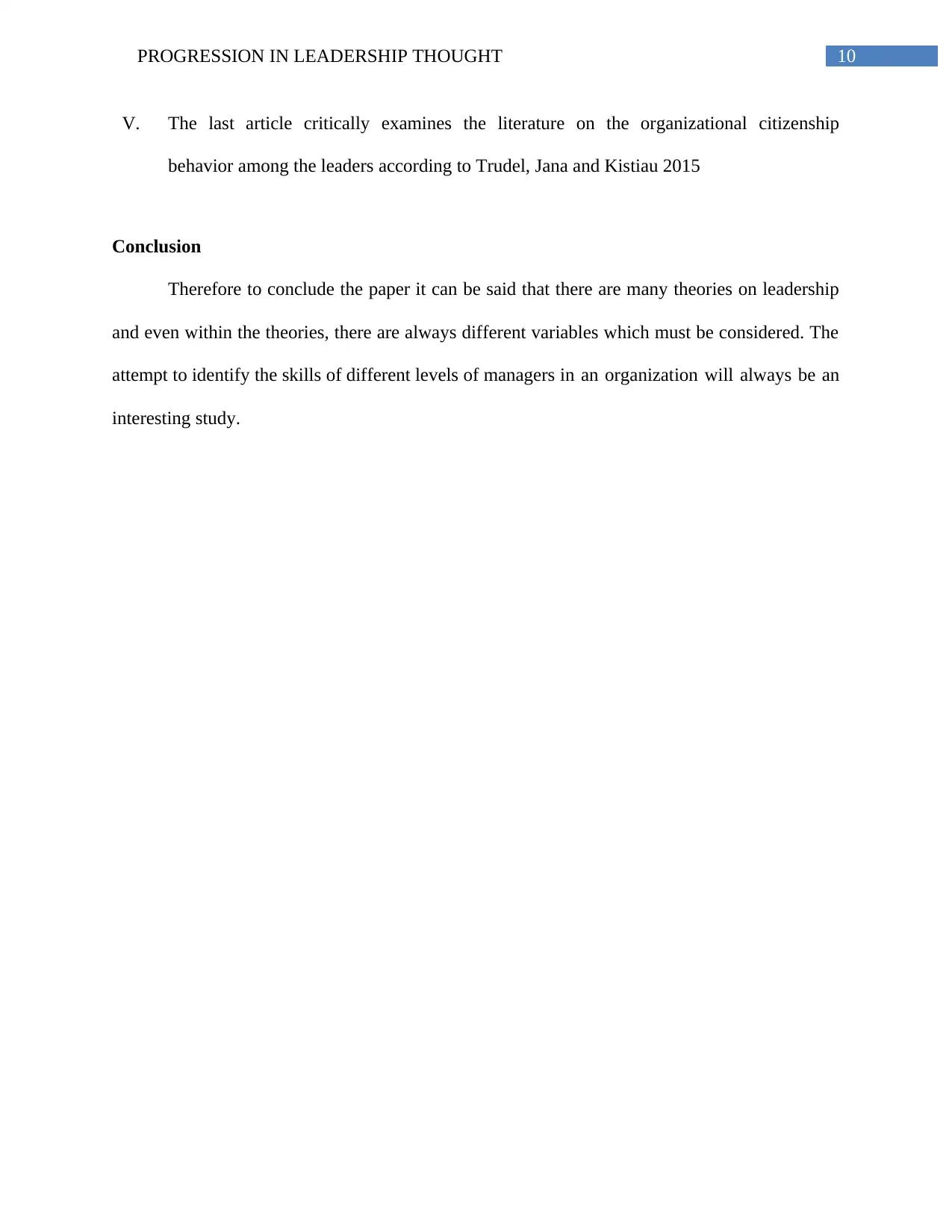
10PROGRESSION IN LEADERSHIP THOUGHT
V. The last article critically examines the literature on the organizational citizenship
behavior among the leaders according to Trudel, Jana and Kistiau 2015
Conclusion
Therefore to conclude the paper it can be said that there are many theories on leadership
and even within the theories, there are always different variables which must be considered. The
attempt to identify the skills of different levels of managers in an organization will always be an
interesting study.
V. The last article critically examines the literature on the organizational citizenship
behavior among the leaders according to Trudel, Jana and Kistiau 2015
Conclusion
Therefore to conclude the paper it can be said that there are many theories on leadership
and even within the theories, there are always different variables which must be considered. The
attempt to identify the skills of different levels of managers in an organization will always be an
interesting study.
1 out of 11
Your All-in-One AI-Powered Toolkit for Academic Success.
+13062052269
info@desklib.com
Available 24*7 on WhatsApp / Email
![[object Object]](/_next/static/media/star-bottom.7253800d.svg)
Unlock your academic potential
© 2024 | Zucol Services PVT LTD | All rights reserved.

